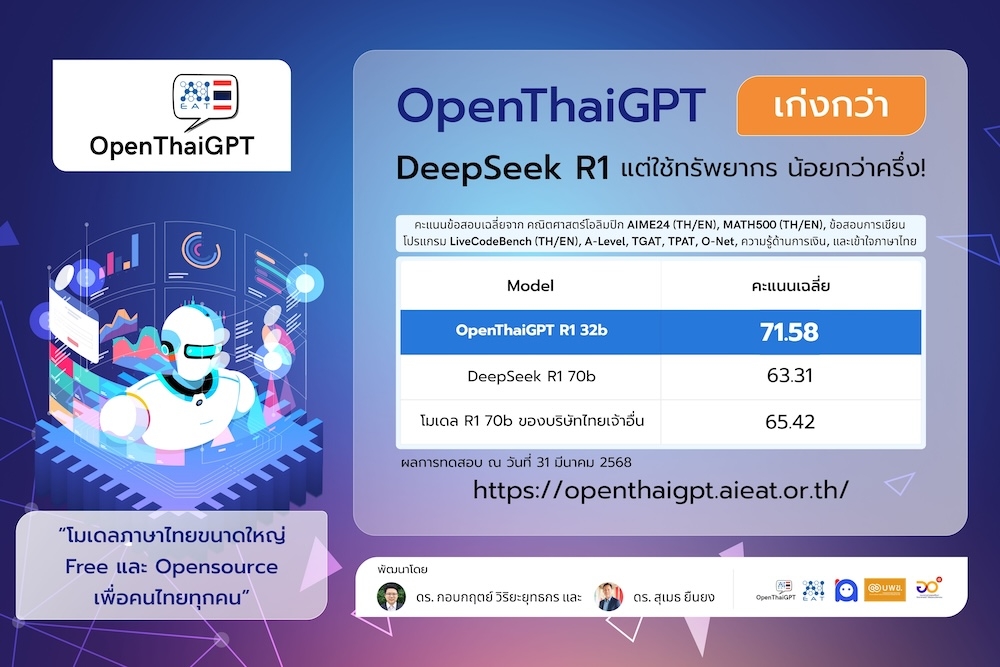🏠ยินดีต้อนรับสู่ OpenThaiGPT 1.6 และ OpenThaiGPT R1
โมเดลภาษาขนาดใหญ่ Free และ Opensource เพื่อคนไทยทุกคน

🇹🇭 OpenThaiGPT 1.6 72b โมเดลภาษาขนาดใหญ่รุ่นล่าสุด ได้รับการปรับปรุงจากรุ่น 1.5 และ 🧠 OpenThaiGPT R1 32b โมเดลด้านการคิดวิเคราะห์และให้เหตุผล และพร้อมให้บริการแล้ว โมเดลนี้ได้รับการพัฒนาเพื่อการใช้งานทั่วไปและมีความสามารถด้านการคิดเชิงเหตุผลที่แข็งแกร่ง โดยเฉพาะอย่างยิ่งในภาษาไทย
ทดลองใช้งาน
ทดลองใช้งานผ่าน ChindaX: https://chindax.iapp.co.th
ดาวน์โหลดโมเดล
OpenThaiGPT 1.6 72b: https://huggingface.co/openthaigpt/openthaigpt-1.6-72b-instruct OpenTHaiGPT R1 32b: https://huggingface.co/openthaigpt/openthaigpt-r1-32b-instruct
🌟 OpenThaiGPT 1.6 72b
OpenThaiGPT 1.6 72b เป็นโมเดลภาษาไทยขนาด 72 พันล้านพารามิเตอร์ ที่ออกแบบมาสำหรับงานทั่วไปพร้อมความสามารถในการคิดวิเคราะห์ที่แข็งแกร่ง ต่อยอดจากพื้นฐานของ OpenThaiGPT 1.5 รุ่นล่าสุดนี้แสดงให้เห็นถึงประสิทธิภาพที่ดีขึ้นในการทดสอบหลากหลายรูปแบบ โดยเฉพาะอย่างยิ่งในด้านการเขียนโค้ดและงานด้านภาษาทั่วไป
จุดเด่น
โมเดลภาษาไทยขั้นสูง ด้วยพารามิเตอร์ 72 พันล้าน
ความสามารถในการคิดวิเคราะห์ที่แข็งแกร่ง ทั้งในภาษาไทยและภาษาอังกฤษ
ประสิทธิภาพที่ดีขึ้น เมื่อเทียบกับรุ่น OpenThaiGPT ก่อนหน้านี้
ความสามารถที่สมดุล ทั้งด้านคณิตศาสตร์ การเขียนโค้ด และงานด้านภาษาทั่วไป
ความเข้าใจที่ลึกซึ้ง ในภาษาไทยและบริบททางวัฒนธรรม
การปรับปรุงหลักใน OpenThaiGPT 1.6 72b
เมื่อเทียบกับ OpenThaiGPT 1.5 72b รุ่น 1.6 แสดงให้เห็น:
ประสิทธิภาพด้านการเขียนโค้ดที่ดีขึ้นอย่างมาก ทั้งในภาษาไทย (LiveCodeBench-TH: 32.43 เทียบกับ 12.61) และภาษาอังกฤษ (LiveCodeBench: 54.21 เทียบกับ 46.38)
ความเข้าใจภาษาทั่วไปที่เทียบเคียงกัน ด้วยความแม่นยำด้านภาษาสูงถึง 98.2%
ความสามารถที่สมดุลดีขึ้น ระหว่างงานด้านคณิตศาสตร์และการเขียนโค้ด
🧠 OpenThaiGPT R1 32b
OpenThaiGPT R1 32b เป็นโมเดลภาษาไทยขั้นสูงขนาด 32 พันล้านพารามิเตอร์ที่เน้นด้านการคิดวิเคราะห์และให้เหตุผล ซึ่งมีประสิทธิภาพสูงกว่าโมเดลขนาดใหญ่อย่าง DeepSeek R1 70b และ Typhoon R1 70b แม้จะมีขนาดเล็กกว่าครึ่งหนึ่ง โมเดลนี้เชี่ยวชาญในงานที่ต้องใช้การคิดวิเคราะห์ซับซ้อน รวมถึงคณิตศาสตร์ ตรรกะ และการเขียนโค้ดในภาษาไทย
จุดเด่น
โมเดลภาษาไทยที่ทันสมัยที่สุด มีประสิทธิภาพสูงกว่าโมเดลขนาดใหญ่ในการทดสอบด้านคณิตศาสตร์และการให้เหตุผลเชิงตรรกะ
ความสามารถในการให้เหตุผลอย่างชัดเจน สามารถแสดงกระบวนการคิดเป็นขั้นตอนได้
ขนาดเล็กกว่าอย่างมีนัยสำคัญ (32b) แต่มีประสิทธิภาพสูงกว่าโมเดลขนาด 70b
เชี่ยวชาญด้านการคิดวิเคราะห์ในภาษาไทย รวมถึงปัญหาคณิตศาสตร์และตรรกะที่ซับซ้อน
ประสิทธิภาพสูงในการเขียนโค้ด ทั้งในภาษาไทยและภาษาอังกฤษ
ผลการทดสอบเปรียบเทียบ
OpenThaiGPT 1.6 72b
Benchmarks
OpenThaiGPT 1.6 72b
OpenThaiGPT 1.5 7b
OpenThaiGPT 1.5 14b
OpenThaiGPT 1.5 72b
Typhoon2 Qwen2.5 7b
Typhoon2 Llama3.1 8b
Typhoon2 Llama3.1 70b
NECTEC Pathumma LLM Text 1.0.0 7b
AIME24-TH
6.67
0
0
6.67
3.33
3.33
13.33
0
AIME24
23.33
6.67
10
23.33
6.67
3.33
10
0
MATH500-TH
43.2
24.2
26.2
62
51.8
31
55.8
21.8
MATH500
82
40.4
47.4
83.2
65.4
49.6
67.4
42.8
LiveCodeBench-TH
32.43
22.52
21.62
12.61
9.91
8.11
27.03
0
LiveCodeBench
54.21
31.12
37.96
46.38
0.98
5.87
37.38
0
OpenThaiEval
78.7
64.5
71.26
77.16
64.76
56.63
72.54
65.27
Language Accuracy
98.2
97.6
98.4
99.4
99.4
98.6
99.8
98.6
AVERAGE
52.34
35.88
39.11
51.34
37.78
32.06
47.91
28.56
OpenThaiGPT R1 32b
SkyThought
OpenThaiGPT R1 32b
DeepSeek R1 70b
Typhoon R1 70b
AIME24-TH
56.67
33.33
53.33
AIME24
63.36
53.33
53.33
MATH500-TH
83.8
75.4
81
MATH500
89.4
88.88
90.2
LiveCodeBench-TH
62.16
53.15
47.75
LiveCodeBench
69.67
64.97
54.79
OpenThaiEval
76.05
74.17
77.59
AVERAGE
71.58
63.31
65.42
Model Technical Report
https://arxiv.org/abs/2504.01789
If OpenThaiGPT has been beneficial for your work, kindly consider citing it as follows:
วิธีการใช้งาน
Online Web Interface
Transformers
vLLM
Install VLLM (https://github.com/vllm-project/vllm)
Run server (เลือกอันใดอันหนึ่ง)
Note, change
--tensor-parallel-size 2to the amount of available GPU cards.
Run inference (CURL example)
หรือเปลี่ยนชื่อโมเดลเป็น "model": "openthaigpt/openthaigpt-r1-32b-instruct" หรือ "model": "openthaigpt/openthaigpt-1.6-72b".
ความต้องการด้านหน่วยความจำ GPU
จำนวนพารามิเตอร์
FP 16 bits
8 bits (Quantized)
4 bits (Quantized)
32b
64 GB
32 GB
16 GB
72b
144 GB
72 GB
36 GB
ใบอนุญาต
โมเดลนี้มีให้ใช้สำหรับ การวิจัย และ การใช้งานเชิงพาณิชย์ ภายใต้เงื่อนไขสัญญาอนุญาติ Qwen2.5 โปรดดูไฟล์ LICENSE สำหรับข้อมูลเพิ่มเติม
การสนับสนุน
เว็บไซต์อย่างเป็นทางการ: https://openthaigpt.aieat.or.th
เพจ Facebook: https://web.facebook.com/groups/openthaigpt
เซิร์ฟเวอร์ Discord สำหรับการสนทนาและสนับสนุน ที่นี่
อีเมล: [email protected]
ทีม OpenThaiGPT

ดร. กอบกฤตย์ วิริยะยุทธกร ([email protected] / [email protected])
ดร. สุเมธ ยืนยง ([email protected])
ดร. ทศพร ฉายอินทร์ ([email protected])
ผู้สนับสนุน

ได้รับการสนับสนุน GPU Nvidia H100 x 8 ใบ จากบริษัท สยาม เอไอ คอร์เปอเรชั่น จำกัด: https://siam.ai/
ได้รับทุนวิจัยสนับสนุนจากกองทุนส่งเสริมวิทยาศาสตร์ วิจัยและนวัตกรรม โดยหน่วยบริหารและจัดการทุนด้านการเพิ่มความสามารถในการแข่งขันของประเทศ (บพข.) ร่วมกับ บริษัท ไอแอพพ์เทคโนโลยี จำกัด ซึ่งมี สมาคมผู้ประกอบการปัญญาประดิษฐ์ประเทศไทย เป็นผู้ดำเนินงานโครงการ
Disclaimer: Provided responses are not guaranteed.
Last updated
Was this helpful?